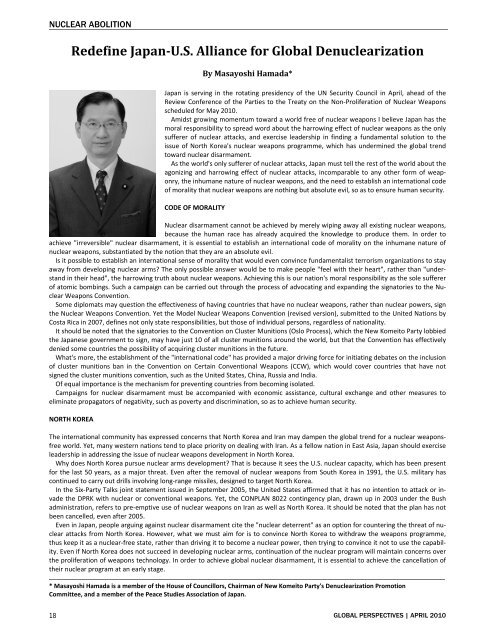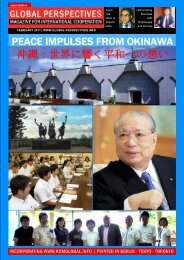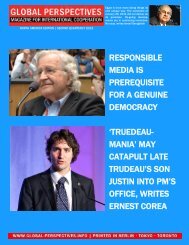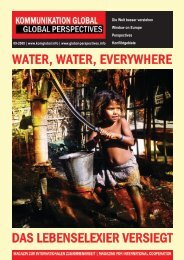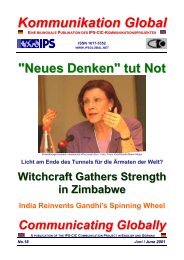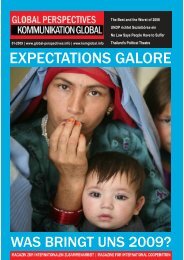NUCLEAR ABOLITIONRedefine JapanU.S. Alliance for Global DenuclearizationBy Masayoshi Hamada*Japan is serving in the rotating presidency of the UN Security Council in <strong>April</strong>, ahead of theReview Conference of the Parties to the Treaty on the Non‐Proliferation of Nuclear Weaponsscheduled for May <strong>2010</strong>.Amidst growing momentum toward a world free of nuclear weapons I believe Japan has themoral responsibility to spread word about the harrowing effect of nuclear weapons as the onlysufferer of nuclear attacks, and exercise leadership in finding a fundamental solution to theissue of <strong>North</strong> Korea's nuclear weapons programme, which has undermined the global trendtoward nuclear disarmament.As the world's only sufferer of nuclear attacks, Japan must tell the rest of the world about theagonizing and harrowing effect of nuclear attacks, incomparable to any other form of weaponry,the inhumane nature of nuclear weapons, and the need to establish an international codeof morality that nuclear weapons are nothing but absolute evil, so as to ensure human security.CODE OF MORALITYNuclear disarmament cannot be achieved by merely wiping away all existing nuclear weapons,because the human race has already acquired the knowledge to produce them. In order toachieve "irreversible" nuclear disarmament, it is essential to establish an international code of morality on the inhumane nature ofnuclear weapons, substantiated by the notion that they are an absolute evil.Is it possible to establish an international sense of morality that would even convince fundamentalist terrorism organizations to stayaway from developing nuclear arms? The only possible answer would be to make people "feel with their heart", rather than "understandin their head", the harrowing truth about nuclear weapons. Achieving this is our nation's moral responsibility as the sole suffererof atomic bombings. Such a campaign can be carried out through the process of advocating and expanding the signatories to the NuclearWeapons Convention.Some diplomats may question the effectiveness of having countries that have no nuclear weapons, rather than nuclear powers, signthe Nuclear Weapons Convention. Yet the Model Nuclear Weapons Convention (revised version), submitted to the United Nations byCosta Rica in 2007, defines not only state responsibilities, but those of individual persons, regardless of nationality.It should be noted that the signatories to the Convention on Cluster Munitions (Oslo Process), which the New Komeito Party lobbiedthe Japanese government to sign, may have just 10 of all cluster munitions around the world, but that the Convention has effectivelydenied some countries the possibility of acquiring cluster munitions in the future.What's more, the establishment of the "international code" has provided a major driving force for initiating debates on the inclusionof cluster munitions ban in the Convention on Certain Conventional Weapons (CCW), which would cover countries that have notsigned the cluster munitions convention, such as the United States, China, Russia and India.Of equal importance is the mechanism for preventing countries from becoming isolated.Campaigns for nuclear disarmament must be accompanied with economic assistance, cultural exchange and other measures toeliminate propagators of negativity, such as poverty and discrimination, so as to achieve human security.NORTH KOREAThe international community has expressed concerns that <strong>North</strong> Korea and Iran may dampen the global trend for a nuclear weaponsfreeworld. Yet, many western nations tend to place priority on dealing with Iran. As a fellow nation in East Asia, Japan should exerciseleadership in addressing the issue of nuclear weapons development in <strong>North</strong> Korea.Why does <strong>North</strong> Korea pursue nuclear arms development? That is because it sees the U.S. nuclear capacity, which has been presentfor the last 50 years, as a major threat. Even after the removal of nuclear weapons from South Korea in 1991, the U.S. military hascontinued to carry out drills involving long‐range missiles, designed to target <strong>North</strong> Korea.In the Six‐Party Talks joint statement issued in September 2005, the United States affirmed that it has no intention to attack or invadethe DPRK with nuclear or conventional weapons. Yet, the CONPLAN 8022 contingency plan, drawn up in 2003 under the Bushadministration, refers to pre‐emptive use of nuclear weapons on Iran as well as <strong>North</strong> Korea. It should be noted that the plan has notbeen cancelled, even after 2005.Even in Japan, people arguing against nuclear disarmament cite the "nuclear deterrent" as an option for countering the threat of nuclearattacks from <strong>North</strong> Korea. However, what we must aim for is to convince <strong>North</strong> Korea to withdraw the weapons programme,thus keep it as a nuclear‐free state, rather than driving it to become a nuclear power, then trying to convince it not to use the capability.Even if <strong>North</strong> Korea does not succeed in developing nuclear arms, continuation of the nuclear program will maintain concerns overthe proliferation of weapons technology. In order to achieve global nuclear disarmament, it is essential to achieve the cancellation oftheir nuclear program at an early stage.* Masayoshi Hamada is a member of the House of Councillors, Chairman of New Komeito Party's Denuclearization PromotionCommittee, and a member of the Peace Studies Association of Japan.18 <strong>GLOBAL</strong> <strong>PERSPECTIVES</strong> | APRIL <strong>2010</strong>
NUCLEAR ABOLITIONFurthermore, <strong>North</strong> Korea would pose an immeasurable threatonce it becomes a nuclear power. Former U.S. Secretary of StateHenry Kissinger wrote in his book 'Nuclear Weapons and ForeignPolicy' that "...a power possessing thermonuclear weapons is notlikely to accept unconditional surrender without employingthem...."Meanwhile, <strong>North</strong> Korea has recently sent renewed signals ofits readiness to move toward resolving the nuclear developmentissue. Firstly, in the <strong>North</strong>east Asia Cooperation Dialogue conferenceconvened in California in October 2009, the attending foreignaffairs official from <strong>North</strong> Korea reportedly delivered apowerful message that the denuclearization of the Korean Peninsularequires not only the resolution of <strong>North</strong> Korea's nucleardevelopment programme, but also further progress in the relationshipsbetween <strong>North</strong> and South Korea, and between Japanand <strong>North</strong> Korea. On January 11, <strong>2010</strong>, <strong>North</strong> Korea's foreignaffairs spokesperson officially proposed talks with the UnitedStates to work toward a peace treaty.As long as <strong>North</strong> Korea presses ahead with its nuclear program,lifting sanctions against the country is out of the question.However, it may be possible to discuss the U.S.‐DPRK peacetreaty under the Six‐Party Talks' working group on a <strong>North</strong>eastAsia peace and security mechanism.It would seek the denuclearization of <strong>North</strong>east Asia parallel tothe process of persuading <strong>North</strong> Korea to abandon its nucleardevelopment programme, In fact, I am convinced that exercisingleadership in such negotiations would firmly set the tide towardfundamentally resolving the deadlock in the Six‐Party Talks andbuilding a "nuclear weapons‐free world".REDEFINING THE JAPAN‐U.S. ALLIANCEThe International Commission on Nuclear Non‐proliferation andDisarmament (ICNND), initiated by the Japanese and Australiangovernments, released a report in Tokyo in December 2009. Thehighlight of the report detailing the Commission's action agendawas the reference to the "sole purpose" declaration, whichrepresents a declaration by nuclear‐possessing states that thesole purpose of retaining the nuclear weapons they have is todeter others from using such weapons against them.This is much more than a simple "declaration". Expectationsare high that the declaration could be the first step toward actualizingdenuclearization, by providing a philosophical foundationfor drastic nuclear arms reduction, and leading to the cancellationof the emergency deployment of nuclear weapons. Thiswould significantly mitigate the risk of incidental nuclear attacks.A debate on the need for nuclear deterrent based on the presenceof specific threat to Japan holds the key to determiningwhether Japan should accept the Sole Purpose declaration.It is the view of the United States that it does not need to usenuclear weapons as deterrent against the anticipated use ofbiological and chemical weapons, which is the primary threatfrom <strong>North</strong> Korea.The United States maintains that the threat of retaliation withconventional weapons is a sufficient deterrent for <strong>North</strong> Korea'suse of biological and chemical weapons on Japan, as stated byformer Defence Secretary William Perry in October 2009 and byassistant Defence Secretary Wallace Gregson in February <strong>2010</strong>.The U.S. National Science Foundation has maintained that:1. The use of nuclear deterrents against the threat of biological/ chemical weapons would facilitate the ease of nuclear proliferation;2. The treaties for banning the use of biological / chemicalweapons should be tightened to control such weapons;3. Such a threat can be controlled with international pressureincluding pressure from the United Nations; and4. Conventional weapons of the United States are more reliablethan the use of nuclear deterrents.In fact, informed sources say that the United States did not havethe option of using a nuclear weapon against Iraq's use of chemicalweapons during the Gulf War in 1991.Among the five nuclear‐armed states, China is the only countrythat has made a no‐first‐use declaration. Therefore, China'santicipated threat to other countries comes from its overwhelmingstockpile of conventional weapons.Former U.S. Secretary of State Henry Kissinger asserted in hisbook ('Nuclear Weapons and Foreign Policy', Harper & Brothers ‐1957, p.I67) that the United States would not use a nuclear deterrentagainst a nuclear power that has intercontinental ballisticmissiles, saying that the U.S. President would not offer 50 U.S.cities in exchange for West Europe.Former director general of the Foreign Ministry's InternationalInformation Bureau, Ukeru Magosaki points out that the greatestdeterrent would be achieved through deepening mutual economicand cultural dependence with China.China relies on the supply of quality components and materialsfrom Japan in achieving the world's largest trade surplus. Magosakiinsists that China would exercise restraint as any disruptionto the supply would cause confusion to its economy.During the Soviet days, Russia held an overwhelmingly largearsenal of conventional weapons, and made a "no‐first‐use"claim about its nuclear weapons. However, the claim was withdrawnin 1993. The country's new military doctrine, released onFebruary 5, <strong>2010</strong>, clearly states its right to the first use of nuclearweapons.If the U.S. nuclear umbrella is not an effective deterrent toother nuclear powers, as warned by Kissinger, then the threat ofRussia's first use of nuclear weapons can be most effectivelycountered by creating a tide of international support for "SolePurpose declaration" and "no‐first‐use declaration".– IDN‐InDepth News Viewpoint <strong>North</strong> Korea has recently sent renewed signals of its readinessto move toward resolving the nuclear development issue. Firstly,in the <strong>North</strong>east Asia Cooperation Dialogue conference convenedin California in October 2009, the attending foreign affairsofficial from <strong>North</strong> Korea reportedly delivered a powerful messagethat the denuclearization of the Korean Peninsula requiresnot only the resolution of <strong>North</strong> Korea's nuclear developmentprogramme, but also further progress in the relationships between<strong>North</strong> and South Korea, and between Japan and <strong>North</strong>Korea. On January 11, <strong>2010</strong>, <strong>North</strong> Korea's foreign affairsspokesperson officially proposed talks with the United States towork toward a peace treaty.As long as <strong>North</strong> Korea presses ahead with its nuclear program,lifting sanctions against the country is out of the question.However, it may be possible to discuss the U.S.‐DPRK peacetreaty under the Six‐Party Talks' working group on a <strong>North</strong>eastAsia peace and security mechanism.<strong>GLOBAL</strong> <strong>PERSPECTIVES</strong> | APRIL <strong>2010</strong> 19


